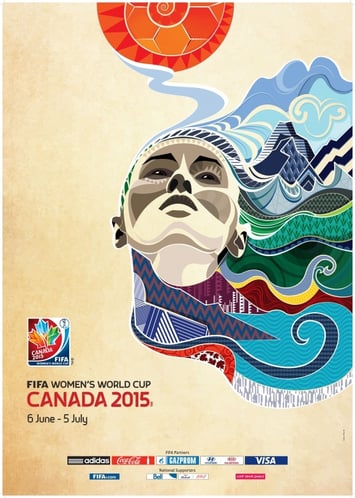2015 Women's World Cup
As a lover of soccer (futbol or football, depending on where you’re from), I hope the Women’s World Cup is a smashing success! Heaven knows, these ladies and their teams deserve their day in the sun. They work and train every bit as hard as their male counterparts for a fraction of the fame and money the men get. (The FIFA World Cup doles out nearly $34 million in prize money to the men and only $966,000 to the women!) One could even argue the women work harder. How many men playing at the World Cup level need to work a second job? For women playing at the same level, second jobs often support their dreams.
Let’s face it, when it comes to supporting the Women’s World Cup, FIFA sucks! Besides the 34 to .9 pay discrepancy, all but 4 matches of the Women’s Cup will be played on artificial turf. Not only is this unfair to the women and presents an increased injury risk, it’s inconsistent with the spirit of the game and something FIFA has never done to the men in the entire history of the World Cup. Hopefully, with the recent and sudden resignation of the often sexist and moronic Sepp Blatter, (the man once suggested that women’s soccer might gain popularity if the ladies' uniforms were more scanty!), FIFA will start to treat the women’s game with a respect and compensation at least somewhat closer to what the men receive.
But when it comes to gender inequality, there’s more going on here than just the FIFA Women’s World Cup.
In fact, it’s not so much that FIFA is the problem, but is emblematic of a larger problem that still plagues much of the world. Leaders of every stripe and field should take note, because there is a high cost to be paid for failing to mind the gender gap. Gaps in gender equality—not only for sports, but for education, legal rights, and in the workplace—hinder countries’ economic growth and development. Women comprise roughly half of the world’s population, and thus half of its potential labor force, and the lack of women in the workforce is problematic. As a recent study in the Harvard Business Review reveals, gender diversity is the engine of economic prosperity.
So, let’s all do our part to make the world a better place—one game at a time! Watch the games. Give these extraordinary athletes their due, boost the TV ratings, and let FIFA and all the sponsors know, we want a more equitable world where our daughters get to dream and play as big as our sons. Who are you cheering for?
Want to learn more about the cultures of the Women's World Cup teams? Click below to explore our Interactive Women's World Cup Map.



